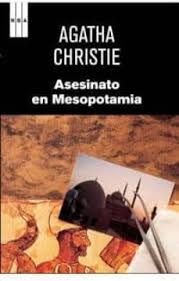
Original Language: English
Títutulus original: Murder in Mesopotamia
Translation: Ángel Soler Crespo
Year of publication: 1936
Valoración: Recommended for fans
In these times when we are, about a century since its first publications, little more can be said about Agatha Christie. Few authors will be whose work is so well known, both through their books and, above all, I think, thanks to its multiple cinematographic versions. The British author is a bit the paradigm of the police novel, with her crimes and her mysteries and, of course, with her peculiar investigators, either Miss Marple o Hercule Poirot.
Murder in Mesopotamia It is a fairly early work, set in Iraq, a region that Christie knew firsthand after his second marriage to an archaeologist. In some of their stays in that country, the possibility that they themselves, archaeologist and novelist should occur, could be the protagonists of one of their plots. Indeed, the trigger for the facts is located in excavations, where the scientist in command and his wife coexist with a more or less conventional work team, men and women whose peculiarities we will discover from a crime.
The scheme does not depart a millimeter from which we can have internalized: surprising murder in an innocent -appearance human group, elucubrations among those present, casual appearance of the cunning detective, in this case Poirot, Research and collection of data that seem banal, and finally the long session of sharing in which light is made on such an impenetrable matter, at which time the criminal has no choice but to admit his guilt.
It is really admirable how Christie manages to spin all the details, rather than the construction of a novel is an exercise of pure ingenuity, a goldsmith work in which everything must fit exactly in its place. Of course, the objective reaches it in an outstanding way, and it is not surprising that several generations of readers and spectators have been admired in the face of such perfection.
We would also find some other appreciable elements from the narrative point of view: the environment, to which much attention is not dedicated, but is well defined; the drawing of characters, who always knows how to leave an opaque area to make the reader doubt; or the shocking figure of the researcher, an almost comic type this Poirothowever its Belgian origin seems the most British of the characters. Nor will I stop commenting that there is a certain left of racism, defining the Iraqis as indigenousunderlining his lazy character and showing indignation for dirt, for example. At the time when the book is written to these objections that today may seem very obvious, they were not certainly given the same attention, and that vision a little above the shoulder was quite coherent in a region under English domain.
It is difficult to maintain the concept of novel in relation to this type of stories. Like almost all of this author there is an almost absolute predominance of dialogue, and the book could without any problem being represented as a play, which has surely been carried out on occasion. From this point of view, as narrative work, it cannot be said that it has great value. Its merit lies in what really is: an entertainment, a game if you want, built with mastery, and that gives the reader exactly what you are looking for, intrigue, some surprise, and the invitation to a certain intellectual exercise in which the author , as is very logical, always carries those to win.
Also of Agatha Christie reviewed in Ulad: here
Source: https://unlibroaldia.blogspot.com/2025/02/agatha-christie-asesinato-en-mesopotamia.html


